The Power of Play
Young children are built for play and play is a natural part of childhood. Bruno Bettelheim, a psychologist, defined play as “the means to allow children to attempt to bridge their reality and the world around them”. Play unearths a child’s interests, desires, and goals. The type of play young children need is characterized by freedom, enjoyment and a leap into settings to explore. Evidence from development science over the last 75 years has demonstrated that play is important for healthy development.
What is play?
Self-chosen and self-directed.
Play is about allowing children to do what they want to do safely instead of what they are supposed to do. Children are engaged through play when the play is self-led. Play is not about putting information into a child but drawing out a child’s ideas, intentions, aspirations, preferences, wants, and wishes.

Process-oriented.
Play is about allowing the child space to explore and learn independence. True play happens when a child is not concerned about goals, results or rewards. Therefore, a child performing at a recital or playing sports in anticipation of a medal, is not considered play. While play can have goals, the goals should be focused on the creation of something (e.g. creating an artwork, building blocks, etc) rather than the creation of a product itself. As children play, they learn important skills that have a lasting impact on their development.
Individually constructed.
Play is structured by the child. It is self-governing, allowing children to create boundaries for themselves. For instance, when a child is engaged in pretend play, they decide how their play will be structured.
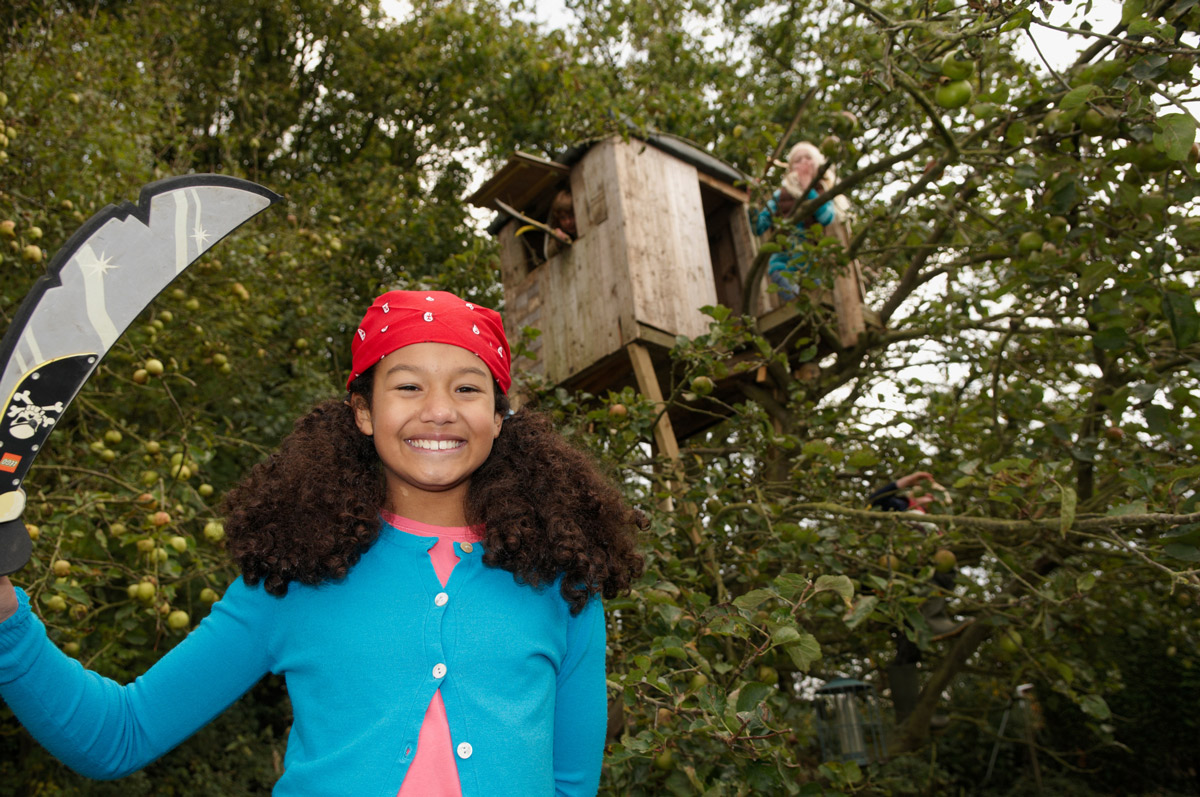
Communicative.
Play allows children to express themselves, despite their lack of words and understanding. Through play, children can communicate verbally, using words or their bodies, and other non-verbal cues. When children play with their peers, children learn and develop social and language skills.
Enjoyable.
Play is not supposed to be stressful. Play provides opportunities for children to have fun and make sense of their world.
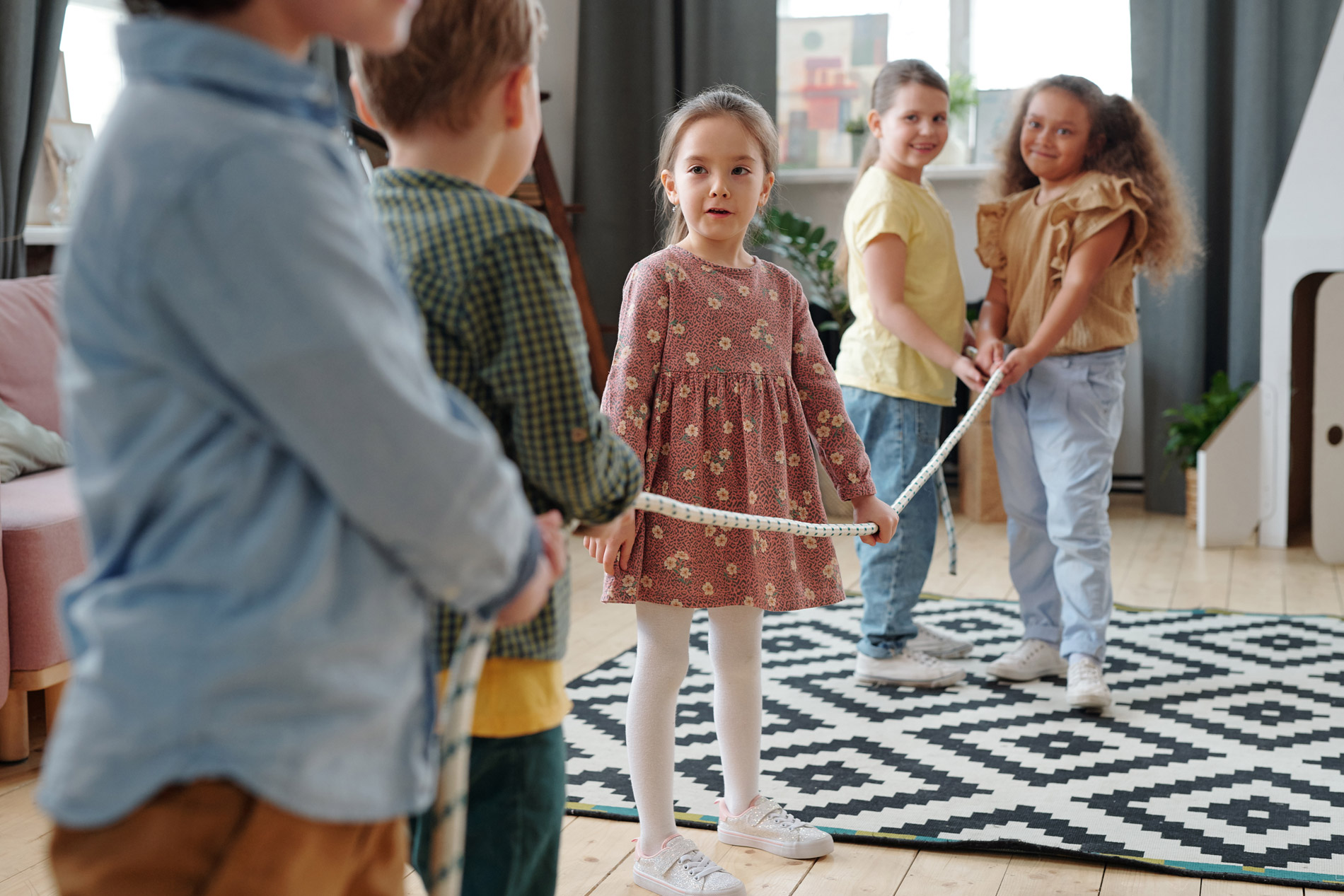
Symbolic.
Symbolic play happens when children use an object or toy to represent something else. Symbolic play involves “pretend playing” with toys that are symbols representing other objects that the child needs as part of the pretend scenario.
Imaginative.
Play encourages imagination, curiosity, sensory experience and experimentation, allowing children to explore unknown or new concepts. Ideas that children share and come up with during play may not be governed by rules that are consistent with the real world. For example, a penguin can’t fly because their wing is broken, when in reality, penguins can’t fly because penguins are aquatic, flightless birds that use their wings as flippers.
Therapeutic.
Play is a natural way for children to relieve stress and work through different emotions and experiences.
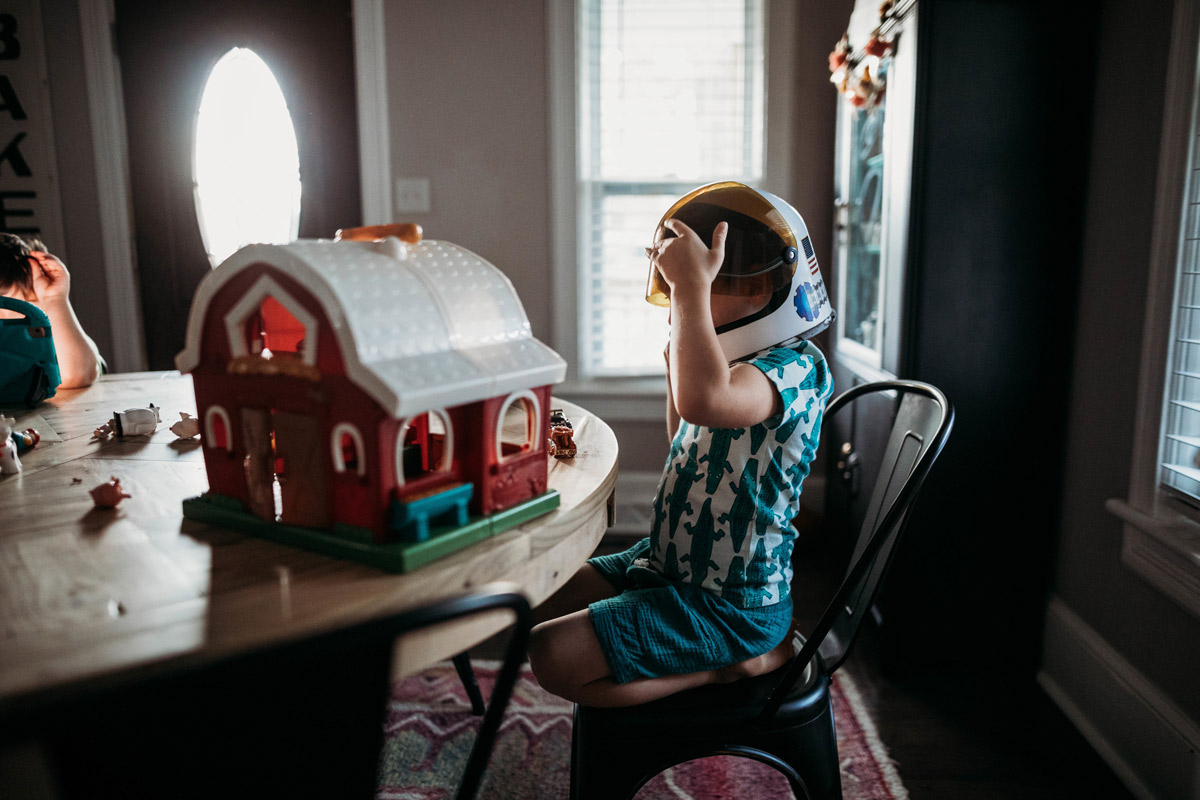
Active.
Young children need active play which involves regular, vigorous, physical activities that take place when children are alert and active. During play, children use their bodies and minds in play by interacting with the environment, materials and other people.
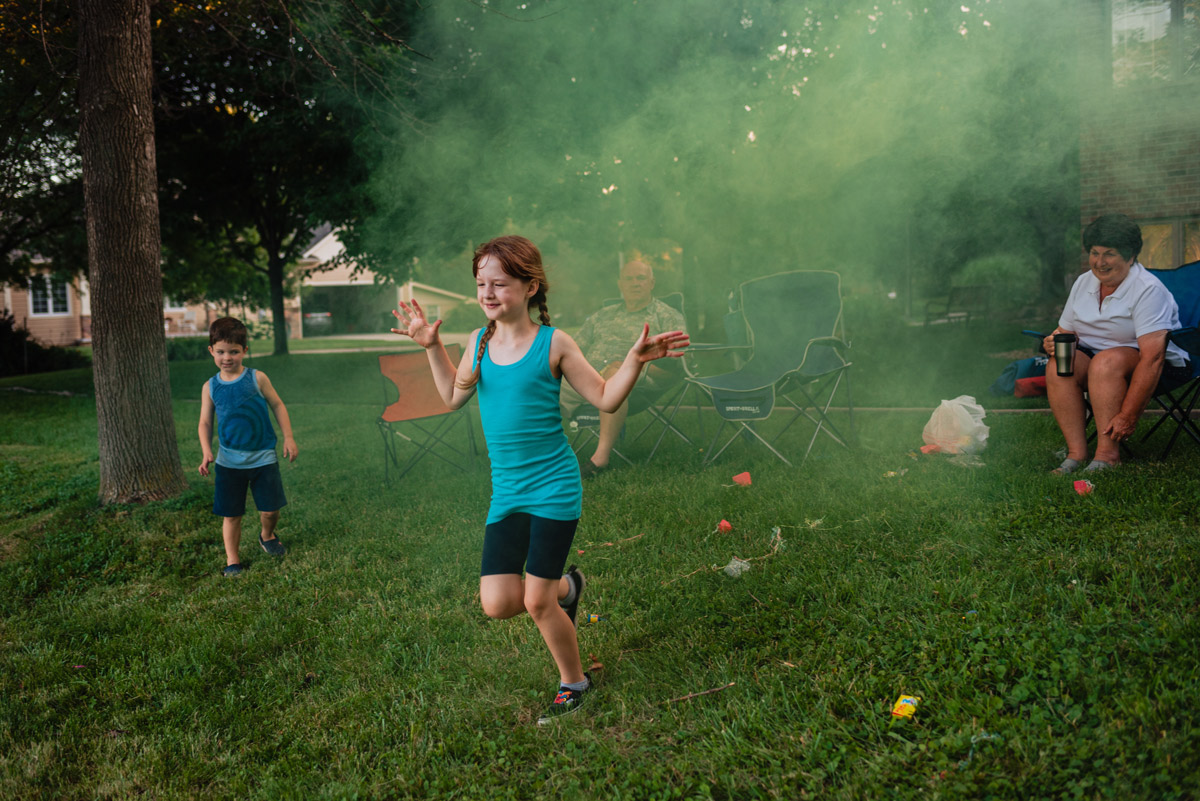
Why do children need to play?
- To forward development and realize their potential
- To find and express their true selves
- To program the brain’s problem-solving networks
- To preserve psychological health and well-being
- To find their creative edge and responsibility
- To practise life in a space free of consequences
Video shared with permission from Harvard University’s Center on the Developing Child
Characteristics of True Play
- Play is not work.
Play is about freedom, imagination, and fun. When the child is playing, their focus should be on the activity rather than on any particular outcome set by an adult or another child. When children are at play, they are engaged and having fun experiencing the activity.
- Play is not for real.
Play is meant to happen outside the realities of everyday life. It is supposed to be free of consequence and risk so that a child can play without worrying about whether they are being judged for doing something right or wrong.
- Play is expressive and exploratory.
Play is not a passive experience where a child is made to be a bystander. Through play, children are able to express themselves and discover new things, rather than being led or directed by an adult. Play involves the outflow of energy from the child. A child should naturally play with numbers, lines, sounds, words, or ideas.
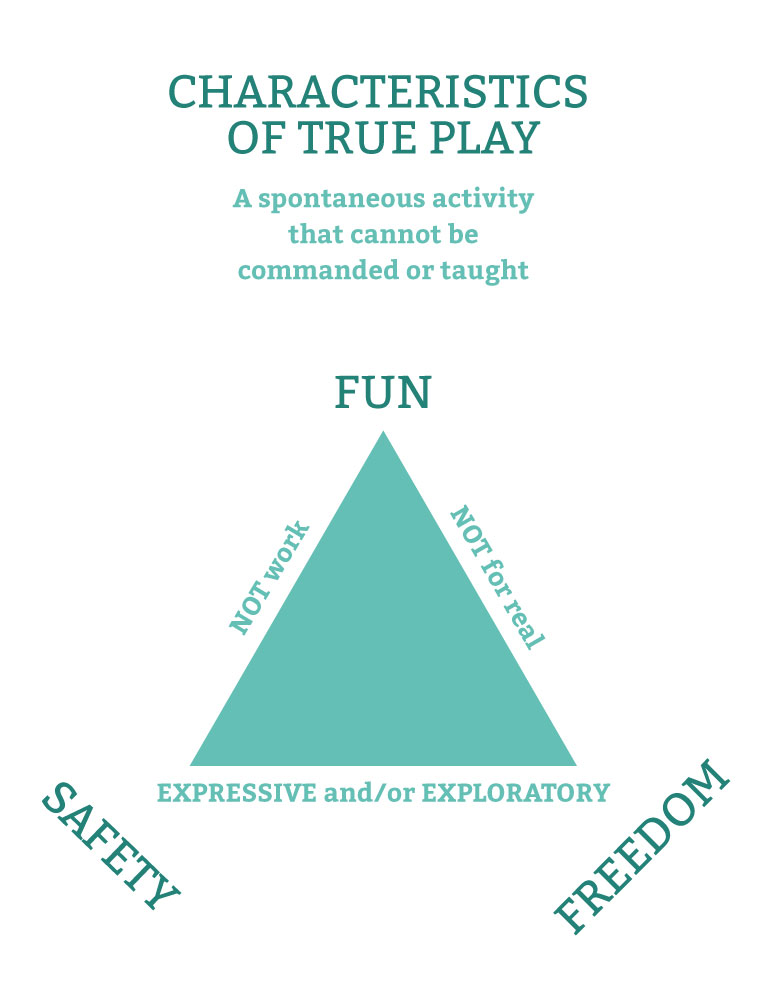
Adapted from Dr. Gordon Neufeld’s Making Sense of Play course
The Decline of Play
Despite the many benefits of play, studies have shown that the amount of time children have spent playing has been declining for decades. “The opportunity for kids to freely engage in play with one another has diminished considerably over the last 50 years,” says Sergio Pellis, a professor of neuroscience at the University of Lethbridge in Alberta. The decline of play in children has been attributed to tightly structured family and school schedules, an increase in parents or caregivers working outside the home, fewer safe places to play, and the rising use of the internet and screen time. According to Dr. Deborah Macnamara, “there is no greater task in raising young children today than creating the conditions that will protect space and time for play”.
In this talk, Dr. Peter Gray compellingly brings attention to the reality that, over the past 60 years, there has been a gradual but overall dramatic decline in children’s freedom to play with other children, without adult direction. Over this same period, there has been a gradual but overall dramatic increase in anxiety, depression, feelings of helplessness, suicide, and narcissism in children and adolescents. Based on his own and others’ research, Dr. Gray documents why free play is essential for children’s healthy social and emotional development and outlines steps through which we can bring free play back to children’s lives.
Supporting Play During the Early Years
Participate and let children take the lead.
Engage in play that’s rich in back-and-forth interactions between you and the child. Pay attention to children’s ideas and interests when playing. Talk about what the child is doing or ask questions to support their play.
Allow them to make mistakes.
As adults, it’s difficult not to take over because we feel like we know the best way to do things and how to avoid mistakes. Mistakes are an important part of play. Allowing children to make mistakes during play gives them the opportunity to evaluate their process after a mistake and to create a new plan which supports critical thinking and problem-solving skills.
Build a playful space.
Create a space where children are safe and free to play and explore as they wish. Remove dangerous items and fill their space with open-ended materials that can be used in many different ways (e.g. playdough, building blocks, etc). Encourage the child to use their curiosity, imagination and problem-solving skills.
Label the emotions children express during play.
This helps children name, identify and express their feelings.
Trust them.
Children are born to play – they just need you to trust them to do it! Give children the space, freedom and permission they need to explore their world through play. Adults should be present to support their play as needed, but learn to let them be.
Play Therapy
Play therapy is a psychotherapeutic approach used to help children aged 2 to 12 explore their thoughts and emotions. The goal of play therapy is to help children learn to express themselves in healthier ways. Therapeutic play usually takes place in a safe, comfortable playroom, where very few rules are imposed on the child, encouraging free expression and allowing the therapist to observe the child’s behaviour and play style.
Play therapy helps children with social or emotional challenges learn to communicate better, develop problem-solving skills, and relate to others in positive ways. It may be used to help children who have experienced or witnessed traumatic events in their lives, such as a serious illness, neglect, abuse, or a family crisis. Play therapy can also help children with learning disabilities, behavioural disorders, anxiety, depression, grief, as well as children with neurodevelopmental disorders such as Attention Deficit Hyperactivity Disorder (ADHD) or Autism Spectrum Disorder (ASD).
Some play therapy activities may include:
- art therapy
- dance
- storytelling
- role-playing
- creative visualization (imagery and fantasy games)
- music
- self-control games
- strategy games
Learn more about the importance of play in early childhood and listen to this episode of The Brain Architects by Harvard University’s Center on the Developing Child. In this podcast, Dr. Jack Shonkoff explains the role of play in supporting resilience and five experts share their ideas and personal stories about applying the science of play in homes, communities, and crisis environments around the world.
References
Else, P. (2014). Making Sense of Play: Supporting children in their play: Supporting children in their play. Open University Press.
MacNamara, D. (2016). Rest, Play, Grow: Making Sense of Preschoolers (Or Anyone Who Acts Like One). Vancouver, BC: Aona Management.
Guralnick, M. (2011). Why early intervention works: A systems perspective. Infants & Young Children, 24, 6-28.
McGhie-Richmond, D., Underwood, K. & Jordan, A. (2007). Developing instructional strategies for teaching in inclusive classrooms. Exceptionality Education Canada, 17(1&2), 27-52.
Shipley, D. (2002). Empowering Children: Play-based Curriculum for Lifelong Learning. Toronto, ON: Thomson Nelson.
Shonkoff, J. & Phillips, D. (2000). Neurons to neighbourhoods: The science of early childhood development. Washington, DC: National Academic Press.
Quiz time!
Take this quick knowledge check about The Power of Play.
Phone
Main:
604-544-1110
Toll-Free Foster Parent Line:
1-800-663-9999
Office hours: 8:30 am - 4:00 pm, Monday to Friday
PROVINCIAL CENTRALIZED SCREENING
Foster parents are encouraged to call this number in the event of an EMERGENCY or CRISIS occurring after regular office hours:
1-800-663-9122
REPORT CHILD ABUSE
If you think a child or youth under 19 years of age is being abused or neglected, you have the legal duty to report your concern to a child welfare worker. Phone 1-800-663-9122 at any time of the day or night. Visit the Government of BC website for more info.
address
BCFPA Provincial Office
Suite 208 - 20641 Logan Avenue
Langley, BC V3A 7R3
contact us
Fill out our contact form...

News
Site menu
Subscribe to Our Newsletter
Charitable Registration #
106778079 RR 0001
Our work takes place on the traditional and unceded Coast Salish territories of the Kwantlen, Katzie, Matsqui and Semiahmoo First Nations. BCFPA is committed to reconciliation with all Indigenous communities, and creating a space where we listen, learn and grow together.
© 2021 BC Foster Parents. Site design by Mighty Sparrow Design.